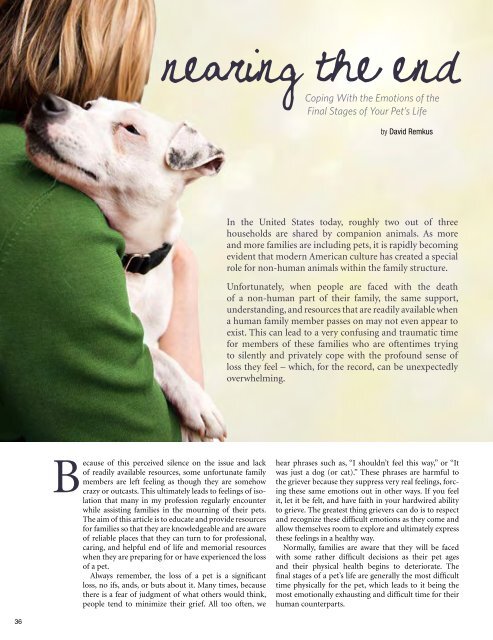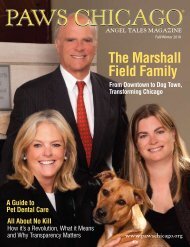nearing the endCoping With the Emotions of theFinal Stages of Your Pet’s Lifeby David RemkusIn the United States today, roughly two out of threehouseholds are shared by companion animals. As moreand more families are including pets, it is rapidly becomingevident that modern American culture has created a specialrole for non-human animals within the family structure.Unfortunately, when people are faced with the deathof a non-human part of their family, the same support,understanding, and resources that are readily available whena human family member passes on may not even appear toexist. This can lead to a very confusing and traumatic timefor members of these families who are oftentimes tryingto silently and privately cope with the profound sense ofloss they feel – which, for the record, can be unexpectedlyoverwhelming.Because of this perceived silence on the issue and lackof readily available resources, some unfortunate familymembers are left feeling as though they are somehowcrazy or outcasts. This ultimately leads to feelings of isolationthat many in my profession regularly encounterwhile assisting families in the mourning of their pets.The aim of this article is to educate and provide resourcesfor families so that they are knowledgeable and are awareof reliable places that they can turn to for professional,caring, and helpful end of life and memorial resourceswhen they are preparing for or have experienced the lossof a pet.Always remember, the loss of a pet is a significantloss, no ifs, ands, or buts about it. Many times, becausethere is a fear of judgment of what others would think,people tend to minimize their grief. All too often, wehear phrases such as, “I shouldn’t feel this way,” or “Itwas just a dog (or cat).” These phrases are harmful tothe griever because they suppress very real feelings, forcingthese same emotions out in other ways. If you feelit, let it be felt, and have faith in your hardwired abilityto grieve. The greatest thing grievers can do is to respectand recognize these difficult emotions as they come andallow themselves room to explore and ultimately expressthese feelings in a healthy way.Normally, families are aware that they will be facedwith some rather difficult decisions as their pet agesand their physical health begins to deteriorate. Thefinal stages of a pet’s life are generally the most difficulttime physically for the pet, which leads to it being themost emotionally exhausting and difficult time for theirhuman counterparts.36
Don’t be afraid toask for help. Inyour community, itis very likely thatthere are others goingthrough what youare going through.Anticipatory GriefWhen a terminal diagnosis is given, orif it is becoming evident that a pet doesnot have much time left, family membersmay begin to feel a great deal of sadness,anger, or a myriad of other emotions.These feelings, known as anticipatorygrief, are a form of grief that occurs priorto the loss. If these feelings become debilitating,the best course of action is toseek out a professional therapist, or tofind a local or online support group. Theemotions that accompany anticipatorygrief are often confusing and isolating.Talking through them in a professionalsetting may not alleviate these feelingsentirely, but they may ease some of thesecondary discomforts that often springfrom these emotions.With this in mind, it is essential thatfamilies take the appropriate actions inthe anticipatory stages to minimize thepotential for feelings such as self loathing,uncertainty, and guilt after the deathoccurs. Many times family members willsay, “What if we had done this,” or “Weshould have tried that.” A good way todefend against this is to have an end oflife plan in place before it is needed. Ifpossible, start by thinking about whatyou would do if you were given a terminaldiagnosis and start gathering facts inorder to be aware of all of your options.End of life care is continually changingand, if desired, euthanasia can be yourfamily’s last resort rather than the onlyoption. This may ultimately reduce thelevel of stress and guilt that is felt afterthe pet passes away.Pet HospicePet hospice and palliative care arequickly emerging as an end of life specialtyand, much like in human hospiceand palliative care, an emphasis is placedon managing pain and preservingdignity during the life to death transition.Dr. Amir Shanan of Chicago is theFounder of the International Associationof Animal Hospice and Palliative Care(IAAHPC.org) and owner of CompassionateVeterinary Care in LincolnPark. Dr. Shanan is leading the way forincreased awareness of end of life carethat is multi-faceted, and sensitive to theimportant differences in culture, faith,and emotional well-being of those whoare trying to navigate the often complicatedand evolving options for end of lifecare. IAAHPC members are progressivethinkers that are committed to both theanimals they serve as well as their survivinghumans.Pain management is a very importantcomponent of hospice and palliativecare. But it is important to keep in mindthat while physical pain management isa crucial part of palliative care, humanpain and grief management are viewed asequally important components. After all,end of life is an experience that createsthe foundation for healthy and effectivemourning in the days, months, and yearsthat follow the loss of family members.EuthanasiaMany times in the end of life stages, theanimal’s quality of life gets to the pointwhere euthanasia may be the most humaneand appropriate course of action.If, after consulting your veterinarian andfamily, you decide that euthanasia is theright choice, decide where you would likethe procedure to take place.Traditionally, euthanasia has been offeredmostly in a clinical setting; however,some veterinarians have begun offeringin-home euthanasia services due to ahuge increase in demand. This option,although sometimes a bit more expensive,can be a peaceful and fitting wayto say goodbye without having to worryabout removing an already struggling petfrom the comforts of home.If you opt for an in home serviceoffered by a veterinarian who is not yourpet’s regular veterinarian, be sure tonotify your regular veterinarian thatyour pet is no longer living. For one, theveterinarian and their staff often timesform an attachment to your pet asthey get to know them throughout theyears, and secondly, this will help yourveterinarian’s office avoid unintentionallyhurting or offending you by sendinghealth and well-being reminders.Continued on page 3837
















